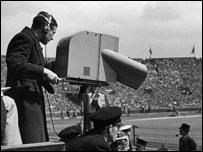音频精选
|
|

|
| Filming the cup final in 1938 - an early experiment in televising soccer |
Many people – perhaps most people – who read this article will never have been to a football match. Yet the broadcast media 广播和电视 have not only transformed the way we enjoy football, they have changed the game itself.
It is surprising how well something as visual 视觉的 / 看得见的 as a live soccer match transfers to radio. The first radio broadcast of a soccer match was made on 22 January 1927: a game between Arsenal and Sheffield United. The broadcaster was of course the BBC.
|
|
Spine-tingling Excitement
|
The novelist Winifred Holtby conveyed the excitement of listening to these early match broadcasts, with the radio relaying 转播 the match from (in her case) "somewhere near our drawing-room curtains". Although she said she couldn't understand what was happening, the game made her spine tingle 令人激动的 and her pulses beat 心跳加快.
The BBC experimented with different ways of describing games to listeners, including referencing a numbered grid (告诉听众) 球员所在的标有数字的球场不同位置 of a football pitch so that people could be told exactly where different players were. In time, a new vocabulary developed denoting 表示/指示 the various moves, passes and strikes in the game.
Despite the popularity of radio transmissions 播放, the English Football League was very worried about the broadcasts. They thought people would listen to the radio instead of paying to attend matches. Smaller clubs were also wary 小心谨慎的 of the extra promotion that the larger clubs received on air 现场播出.
So in 1931 radio coverage 电台播出 of all matches was banned, except for the FA Cup final. In later years the ban was relaxed but the Football League insisted on keeping which matches would be covered a secret until the match day.
After some early experiments, the televising 电视转播 of matches began properly in the 1950s. As with radio's soccer vocabulary, a visual language of close-ups 特写, elevated shots 高空拍照 and replays 转播 was slowly developed over the following decades.
Each game was given a narrative 综合的节目介绍和总结 which extended before and after the match itself. It began with an exciting build-up 铺垫, continued with some football punditry 专家评论 at half-time and ended with post-match analysis 赛后的分析 and replays.
|
|

|
| George Best, who some people say was football's first superstar thanks to television |
Some fans, however, had their doubts about football on TV. 'Armchair fans' 坐在家里看比赛的球迷 were derided 嘲笑 for supporting clubs located at the other end of the country or abroad. The televised game, for all the 尽管有 advantages of instant replays and on-screen statistics, was said to be a diluted 淡化了version of the real thing.
And the Football League also remained uneasy about the potential damage television could do to the sport.
Things changed quite suddenly in the early 1990s. Satellite television brought new competition for soccer's TV rights 电视转播权 which improved football's bargaining power 讨价还价的资本/身价.
In 1992, England's top football clubs broke away 叛离 from other leagues to form the Premier League. They sold full coverage of Premiership games to Sky Television for £304 million (about 3.4 billion yuan with today's exchange rate). In 1996, this figure increased to £607 million (6.8 billion yuan) and by 2003 it was £1.1 billion (12.3 billion yuan) for rights to just some of the games.
Greater television coverage also increased the value of sponsorship, perimeter advertising 在球场内做广告 and merchandising rights. Suddenly the game was awash with money 充斥着金钱的.
Most of this new money went – and still goes - on players. Players' fees have gone through the roof 无边际的 since the turn of the millennium with Cristiano Ronaldo's $131 million (896 million yuan) transfer to Real Madrid last week marking a new record high. Nowadays players and their agents are very aware of their value to clubs, not just for their performances on the pitch, but for the star quality they bring to their club's brand.
Most leagues have a system whereby clubs get more money depending on where they finish in the league and how many of their matches are televised. This has led to a concentration 集中 of money in the hands of just a few clubs at the top of each league. This is a realisation of one of the fears soccer clubs had back in the 1930s.
But the other fear from that time – that more soccer broadcasting would lead to a drop in ticket sales – has not become a reality. Turnstile traffic 到球场去看比赛(进入旋转们)的人流量 has gone up in all football leagues except in Italy.
The feeling that the televised game is a dilution of the 'real thing' has also diminished 消失/消退. Many people watch football games with their friends at home or in the pub, where they are, to some extent, able to recreate the atmosphere 气氛 of the stadium.
|
|
Rancour, Rumour and Reflections
|
Blogs and phone-in radio shows (听众)通过电话参与的广播节目 are a platform for fans to be more engaged with the sport than ever before. What David Goldblatt describes as a "vast buzzing cacophony 嘈杂的声音 of rancour 愤怒的情绪" is many fans' chance to air their opinion about the game they love.
Whether or not you think football is better for the influence of broadcasting, one thing is for sure. With a Premier League audience of over a billion across 141 countries, it is a lot bigger.

